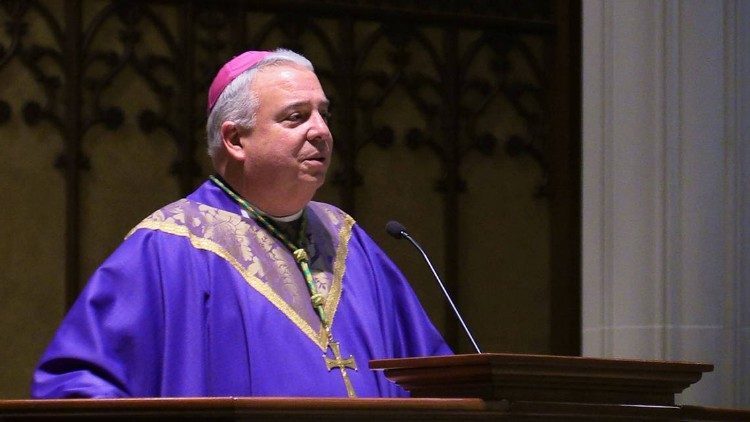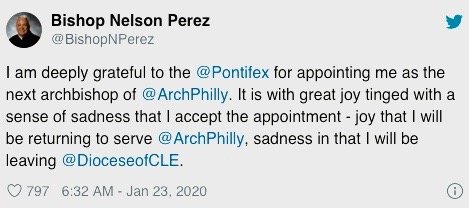This Thursday, Pope Francis named Cuban-American Nelson Pérez, 58, as archbishop of the archdiocese of Philadelphia, the first of Cuban origin in the United States. The priest was elevated to that responsibility after serving as bishop in the city of Cleveland since 2017 and after an ecclesiastical career that began 25 years ago with his ordination precisely in Philadelphia in 1989.
In 1998, Pope John Paul II had appointed him his personal chaplain, and eleven years later his successor, Pope Benedict XVI, made him “honorary prelate.”
According to Catholic sources, his elevation to archbishop is seen as a commitment of the Catholic Church to revitalize the Christian faith in Philadelphia, a city affected by a galloping desertion of the faithful from the temples because of the allegations of pedophilia in the archdiocese and financial shortfalls. His election also seeks to boost the work of the 215 parishes, their 460 priests and a network of Catholic universities and schools serving more than 141,000 students, according to the Inquirer.
Monsignor Pérez was born in Miami in 1961, a few months after his Cuban parents left Cuba. With this appointment he becomes the United States’ first Hispanic and Cuban-American archbishop. The closest ones were Father Félix Varela, who was appointed Vicar General of New York in 1837, and Monsignor Agustín Román, deceased in 2012, who was auxiliary bishop of Miami since 1979.
After the Vatican’s announcement, the new archbishop wrote on his Twitter account that he was “deeply grateful to the Pontiff for appointing me as the next archbishop of Philadelphia” and that “it is with great joy tinged with a sense of sadness that I accept the appointment―joy that I will be returning to serve the Philadelphia Archbishopric, sadness in that I will be leaving the Cleveland Diocese.”
Pérez is replacing Archbishop Charles Chaput, who is preparing to retire this year when he turns 75, the maximum age to practice, and who has had his clashes with the Catholic Curia for his conservative positions in relation to divorce, the reform of the code of court sentences, gun control and sexual abuse within the curia, to which he did not pay the necessary attention.
With the appointment of the Cuban-American, according to Catholic media, Pope Francis wants to provide the archbishopric with a more open and progressive vision in accordance with his postulates.
“The now archbishop Pérez is closer to Pope Francis. When he was auxiliary archbishop in Philadelphia, he was known for his attention to parishioners’ complaints, for attending to the unprotected. At that time, he was a person who did not get tired of denouncing the abuses against immigrants by the immigration authorities,” explains layman Jorge Tavares, who lives in Miami and knows the new archbishop since high school.
At the end of January last year, being bishop of Cleveland, Pérez strongly criticized President Donald Trump’s immigration policy, which he described as “amoral,” and said that the separation of families on the southern border of the United States is not a political but moral problem.
“This is the result of an immigration system that is broken. We’ve lost our moral compass,” he then told the Cleveland.com site.
Two weeks before, after a raid where about 100 undocumented workers were sent to jail and were separated from their families, the then bishop of Cleveland issued a statement criticizing the fact, in which he said that the Catholic church has a duty to point out the moral consequences of an extremist immigration policy.
Before entering the seminary, the new archbishop had a Bachelor of Arts degree from Montclair State University, in New Jersey, and taught elementary school in Puerto Rico. His ordination as archbishop will take place on February 18 in St. Peter’s Basilica, in Rome.











